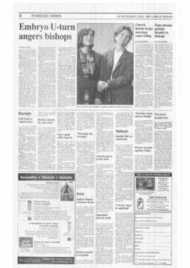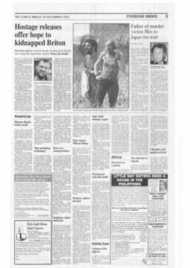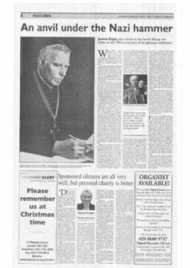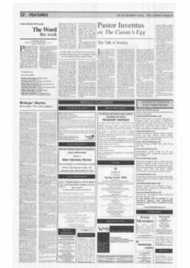Page 6, 28th November 2003
Page 6
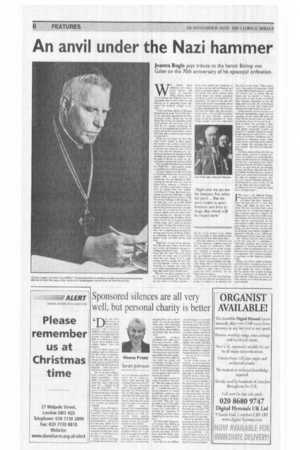
Report an error
Noticed an error on this page?If you've noticed an error in this article please click here to report it.
Tags
Share
Related articles
Pope To Beatify ‘lion Of Münster’
Here We Go Again
He Was A Hater Of The An-german Ilitlerism
From Mr Karol Gajewski Sir, I Was Surprised To Read
Lion Of Munster Challenges Hitler
An anvil under the Nazi hammer
Joanna Bogle pays tribute to the heroic Bishop von Galen on the 70th anniversary of his episcopal ordination
nth debates about' euthanasia now routine across Europe, and forms of legalised killing already permit ted in Holland and Belgium, this is an appropriate time to look at the life and message of an outstanding figure who spoke with prophetic courage on this topic.
Count von Galen, Bishop of Munster, became known as the "I Ann of Munster" for his outspoken opposition to the Nazi euthanasia policy during the Second World War. In fact, his opposition to the Nazis predated the war years; back in 1936 he was already denouncing the party for its paganism and its attacks on priests and laymen who had been sacked from their jobs or suffered imprisonment for their beliefs.
When the war began, he tried, like other Church leaders, to show support and loyalty to his country's soldiers, but the pressure of events made it impossible to remain silent about the evils of Nazi rule, especially the launching of a systematic programme of euthanasia for the mentally and physically disabled. From his pulpit in Munster, he spoke out, giving details of people who had been killed — they included disabled men from the First World War — and urging his people to stand firm for Christian teaching.
Clemens August von Galen was born at Oldenburg Castle into an aristocratic family with a long tradition of Catholicism. He was ordained in 1904, working for several years as a priest in Berlin before returning to Munster in 1919. and being consecrated bishop in 1933 by Cardinal Karl Josef Schulte. Archbishop of Cologne. His family background and heritage made him a natural patriot, and his passionate defence of the Church and challenge to the ideology of the Nazi party were inextricably bound up with a deep love of Germany and con-' cern for the people entrusted to his spiritual care. It is a vision of life that is at variance with the politically correct ideas of our own day, too — his idea of a bishop was essentially that of a father, and the virtues that he saw as essential included courage, hope, and a spirit of penance and service. For him, the teachings of the Church were not merely a set of guidelines, but a complete and unchangeable message passed down by Divine authority, explaining the deepest truths about human beings and their destiny with God.
"Right now, we are not the hammer, but rather the anvil. Others, for the most part enemies and apostates, beat upon us seeking to bend us by force ... But take a lesson from the forge! The anvil cannot and need not strike back; it need only stand firm and strong. If it is tough enough, and firm enough, the anvil outlives the hammer. And no matter how forcefully the hammer may strike, the anvil stands in quiet firmness and lives to shape that which will be forged anew."
That was von Galen speaking in 1941 in a sermon denouncing the Nazi euthanasia programme. He referred during the course of various sermons — which were printed and distributed so that they were read all over Germany and made an enormous impact — to the fact that people were being removed from mental homes and various institutions and dying in secret and mysterious circumstances. He spoke of one man, disabled as the result of an accident, whose mental state had resulted in his having to be given institutional care. But this man still loved his family and enjoyed their regular visits — he was able to communicate and their affection remained strong, as did his enjoyment of many simple pleasures. So it was with honor that his family learned of his sudden death and spoke of their realisation that he had simply been deliberately killed.
Opposing euthanasia in Germany was of course dangerous. Families expressed their feelings by deliberately oddlyworded obituary notices in the newspapers "suddenly, in unexpected circumstances" and so on. Von Galen's outspoken and forthright statements lit a fuse. The Rhineland was deeply and traditionally Catholic. The government was undecided about what to do. Arresting the bishop could have created circumstances in which an entire part of Germany would have been disaffected. So von Galen's life was spared.
Much earlier, in 1936, Galen had spoken of the pressure that was being put on people to conform to an ideology that they knew to be wrong: "What a heavy load is that conflict of conscience which so many officials and employees, parents and teachers have to sustain, who are forced into the position of having to choose between their loyalty to God and their Christian conscience on the one hand, and on the other the good pleasure and favour of those from whom their positions and their livelihood depend."
At that point the country was not at war and mass extermination camps were not operating. People could still listen and learn. But the pressure of the new ideology was very strong. All sorts of rituals many of them very powerful in their imagery — were used to make Nazism seem deeply meaningful, genuine and attractive to a people yearning for an upto-date message by which to live. A oldfashioned traditional Catholicism with its emphasis on repentance, prayer, neighbourly service, and on the sacred value of every human life, including the most frail, seemed dull and even backwardlooking.
Von Galen died not long after the war ended, having survived a strange existence in his ruined city among homeless people left destitute by the bombing and hounded by a govenunent that loathed him and all that he still tried to represent. But he was right about the anvil helping to shape the future. After the war, when the Catholic Konrad Adcnauer sought to build a new nation and community from the ashes of defeated Germany, there were just enough Christians and decentminded people to make it work. Not all the old values had been crushed out something survived "to shape that which has to be forged anew".
Fer today's very different Europe, one message is that it is best to fight evil when it first arises, listening to those who first warn of it, rather than waiting until things go from bad to worse. We have not, thank God, to face anything like the evil the Nazis inflicted. But we do have pressure to legalise the killing of the very frail, those with serious brain damage who need to be fed by tube, those who are semi-conscious or who seem unable to make a full recovery from grave injuries. Those who advocate such killing are often humane and basically decent people, motivated by a dislike of a approach to life that seems hidebound, old-fashioned, Church-based and stuffy.
The Church, however, always speaks at her best when she is confronting a fashionable ideology and showing the splendour of time-honoured truth. Von Galen's words on euthanasia ring clearer than those of Christian leaders who tried to compromise with National Socialism or apologise for the Church as old-fashioned.
Bishop von Galen's tomb in Munster cathedral receives a regular stream of visitors and is always decorated with flowers and candles. His cause of beatification has already been accepted in Rome and he is expected to be declared officially Blessed within the next couple of years. Saying no to euthanasia puts us in good company.
blog comments powered by Disqus





